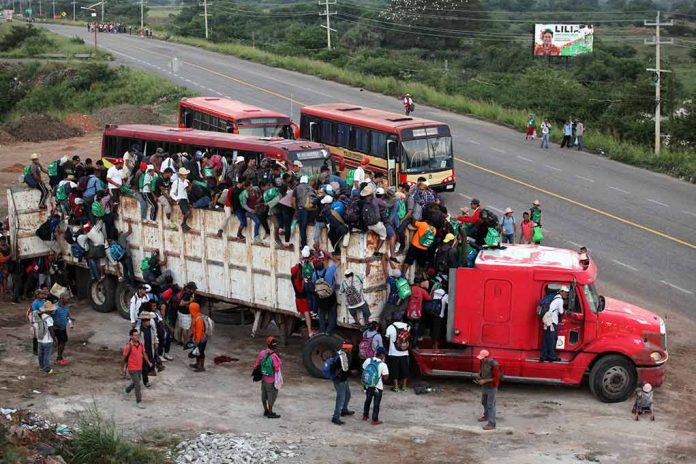
Rwanda is negotiating with the Trump administration to accept criminals deported from the United States, potentially sending dangerous criminal migrants over 7,500 miles away from American borders.
Key Takeaways
- Rwanda has confirmed it is in preliminary discussions with the U.S. about accepting deported migrants as part of Trump’s aggressive immigration enforcement strategy
- Secretary of State Marco Rubio is actively seeking countries “far away from America” to take deported criminals to prevent their return to the U.S.
- El Salvador has already established a successful deportation partnership with the U.S., accepting gang members into its Terrorism Confinement Center
- Critics raise concerns about Rwanda’s human rights record under President Paul Kagame, including allegations of unlawful killings and harsh prison conditions
- The timing of the talks coincides with the ongoing conflict in the Democratic Republic of Congo involving Rwanda-backed rebels
Rwanda Confirms Discussions with Trump Administration
Rwandan Foreign Minister Olivier Nduhungirehe has officially confirmed that his government is engaging in preliminary talks with the United States regarding a potential agreement to accept deported migrants. This development marks a significant step in the Trump administration’s comprehensive immigration enforcement strategy, which focuses on removing illegal immigrants and preventing their return to American soil. The discussions are currently in the early stages, with Rwanda potentially joining other nations in international partnerships designed to support U.S. immigration enforcement priorities.
“We are in discussions with the United States,” confirmed Rwandan Foreign Minister Olivier Nduhungirehe.
Rwandan Foreign Minister Olivier Nduhungirehe said his country is "in discussions with the United States" to receive migrants deported by the Trump administration. https://t.co/n7FjwdhNn2
— Fox News (@FoxNews) May 5, 2025
Strategic Deportation Partnerships
Secretary of State Marco Rubio has been explicit about the administration’s goals, stating they are actively seeking international partners willing to accept deported criminal migrants from the United States. The strategy emphasizes deportation to distant countries to minimize the likelihood of deportees making their way back to American borders. El Salvador has already entered into such an arrangement, agreeing to house deported criminals, including members of the notorious Venezuelan gang Tren de Aragua, in its specialized Terrorism Confinement Center for what officials describe as a “modest fee.”
“I say this unapologetically, we are actively searching for other countries to take people from third countries. We are working with other countries to say, ‘We want to send you some of the most despicable human beings to your countries, will you do that as a favor to us?’ And the further away from America, the better, so they can’t come back across the border,” said Secretary of State Marco Rubio
The administration has prioritized these deportation agreements as part of its broader strategy to enforce immigration laws and remove individuals who have entered the country illegally. Rwanda’s potential role in this effort would follow the El Salvador model, which has proven effective in removing dangerous criminals from American communities while ensuring they cannot easily return to the United States due to the significant geographical barriers and international cooperation in monitoring deportees.
The central African nation of Rwanda is in discussions with the Trump administration on a possible deal to accept deported migrants from the United States, the country's foreign minister says. https://t.co/BftqCZN3hz
— NBC News (@NBCNews) May 5, 2025
Human Rights Concerns and Regional Complications
Critics have raised significant concerns about Rwanda’s human rights record under President Paul Kagame’s administration. A 2023 State Department report highlighted concerning issues, including unlawful killings, arbitrary detention, harsh prison conditions, and restrictions on free expression. Despite these documented concerns, Rwanda appears eager to engage with the Trump administration on immigration matters. This eagerness may be influenced by the potential economic benefits of such an agreement and Rwanda’s interest in maintaining positive relations with the United States.
“This is a country where the elections are routinely rigged, where opposition activists disappear and are found murdered…where opposition leaders aren’t allowed to run in the elections, journalists are jailed or end up fleeing the country,” said Michela Wrong
Complicating matters is Rwanda’s involvement in the ongoing conflict in the Democratic Republic of Congo, where Rwanda-backed rebels have been active. The United States is currently engaged in peace negotiations in the region, with potential investments in Congo’s valuable minerals sector contingent on resolving the conflict. Some foreign policy experts have expressed worry that a deportation agreement with Rwanda could potentially reduce American leverage in pressuring Rwanda to withdraw support from rebel forces in Congo.
Rwanda’s Previous Migration Agreements and Current Stance
Rwanda is no stranger to international migration agreements, having previously entered into an arrangement with the United Kingdom to accept asylum seekers. That deal was ultimately canceled in 2022 after facing legal challenges and international criticism. Despite this setback, Rwanda appears open to new partnerships under President Kagame, who has expressed alignment with President Trump’s unconventional governance approach, stating, “President Trump has an unconventional way of doing things, and I completely agree with him on many things.”
“President Trump has an unconventional way of doing things, and I completely agree with him on many things,” said Rwandan President Paul Kagame
As discussions progress, both nations will need to address the logistical, financial, and humanitarian aspects of any potential agreement. For the Trump administration, such a deal would represent a significant win in its immigration enforcement efforts, particularly in removing criminal elements from American society. For Rwanda, the agreement could bring economic benefits and strengthened diplomatic ties with the United States, though it will likely face scrutiny from human rights organizations and international observers concerned about the treatment of deportees in Rwanda.




